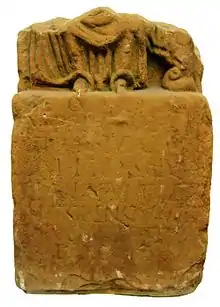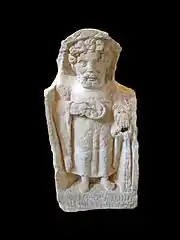Ritona
Ritona (also known as Pritona) is a Celtic goddess chiefly venerated in the land of the Treveri in what is now Germany. Her cult is attested at Pachten and at Trier, where she "had a carefully built little temple" in the Altbachtal complex.[1] Ritona's temple was one of several in the Altbachtal to include exedrae and courtyards that may have been used to prepare ritual banquets and/or to place offerings.[2] At Pachten her temple also had a theatre, presumably used for performances of a religious nature.[1]

O.D. T.PRIITONAE. DI VINAE SIVE CA... IONI PRO SALVTE VICANORVM CONTI OMAGUS ENSIVMTER TINIUS MODESTVS F.C.V.S.
Name
The theonym Ritona is generally interpreted as meaning 'that of the ford', stemming from the Gaulish root ritu- ('ford'; cf. Old Irish Humar-rith, Welsh rhyd 'ford').[3][4] This suggests that she was a goddess of fords;[5] Jean-Marie Pailler remarks that, "Water crossings required religious precautions that were written into the landscape, toponymy, and ritual: Ritona is thus well at home among the 'crossers' who were the Treveri".[6] The translation 'that of the course [of the river]' is also possible, by deriving Ritona from the homonym root ritu-, rito- ('course'; cf. Old Irish riuth, Welsh rhed 'course'), although the name Trēveri is also generally seen as meaning 'those crossing the river', that is to say the 'ferrymen'.[3]
The variant Pritona is directly attested twice: on the goddess's only inscription at Pachten (PRITONAE DIVINAE SIVE CA[...]IONI),[7] and in conjunction with ‘Ritona’ on an inscription from Trier (DEA RITONA PRITONA).[8] Pritona is also restored in a further, more fragmentary inscription from Trier (RITO/[NAE] SIVE EX IV[SSV PR]/ITONI[AE?]).[9] A single inscription also honours her at Uzès in southern France.[10]
Role
Lothar Schwinden characterizes Ritona as a mother goddess on the basis of the statue of a seated goddess found at Pachten, which he connects with the well-known local type of seated mother goddesses with dogs or babies on their laps (cf. Aveta).[11]

The Pachten inscription specifies that the goddess was invoked by an individual "for the well-being of the townsfolk of Contiomagium" (PRO SALVTE / [V]IKANORVM CONTI/OMAGIENSIVM).[7] A votive sculpture from Crain, depicting a male figure holding an offering-dish and pouring out liquid from a vessel, is dedicated to Minerva and Ritona.[12] On two of the inscriptions from Trier, Ritona is invoked in conjunction either with the numina of the Augusti (see imperial cult)[13] or in honour of the divine house (the imperial family).[14]
References
- Edith Mary Wightman (1970). Roman Trier and the Treveri. Rupert Hart-Davis, London. p. 217.
- John Scheid (1995). "Les temples de l'Altbachtal à Trèves : un "sanctuaire national"?". Cahiers du Centre Gustave Glotz. Editions de Boccard. 6: 236.
- Delamarre 2003, pp. 259–260.
- The Celtic root *ritu- is thought to derive from the same Indo-European root *pr̻tu- that gives Latin portus 'port' and English 'ford'. Lenka Dočkalová; Václav Blažek (2011). "On Indo-European Roads". The Journal of Indo-European Studies. 39 (3 & 4): 312.
- Miranda Green (1997). Dictionary of Celtic Myth and Legend. Thames and Hudson Ltd. London.
- Jean-Marie Pailler (2013). "Mères, Fils et confréries à l'écoute de la Source : témoignages antiques et approche par la toponymie, l'archéologie et l'épigraphie gauloises". AFEAF: 321. Original quote: Les passages de cours d’eau nécessitaient des précautions religieuses inscrites dans le paysage, la toponymie, le rituel : Ritona est ainsi bien à sa place chez les “passeurs” que sont les Trévires.
- AE 1959, 00076, retrieved from the Epigraphik-Datenbank Clauss / Slaby Archived 2008-04-09 at the Wayback Machine on 29 March 2008.
- AE 1928, 00185, retrieved from the Epigraphik-Datenbank Clauss / Slaby Archived 2008-04-09 at the Wayback Machine on 29 March 2008.
- AE 1989, 00547, retrieved from the Epigraphik-Datenbank Clauss / Slaby Archived 2008-04-09 at the Wayback Machine on 29 March 2008.
- CIL XII, 02927, retrieved from the Epigraphik-Datenbank Clauss / Slaby Archived 2008-04-09 at the Wayback Machine on 29 March 2008.
- Lothar Schwinden. "Muttergöttin der Treverer: Ritona". In Sabine Faust et al. (1996) Religio Romana: Wege zu den Göttern im antiken Trier. Rheinisches Landesmuseum Trier.
- CIL XIII, 02892, retrieved 3 May 2016.
- AE 1989, 00547, retrieved from the Epigraphik-Datenbank Clauss / Slaby Archived 2008-04-09 at the Wayback Machine on 29 March 2008.
- Finke 00030, retrieved from the Epigraphik-Datenbank Clauss / Slaby Archived 2008-04-09 at the Wayback Machine on 29 March 2008.
- Bibliography
- Delamarre, Xavier (2003). Dictionnaire de la langue gauloise: Une approche linguistique du vieux-celtique continental. Errance. ISBN 9782877723695.

